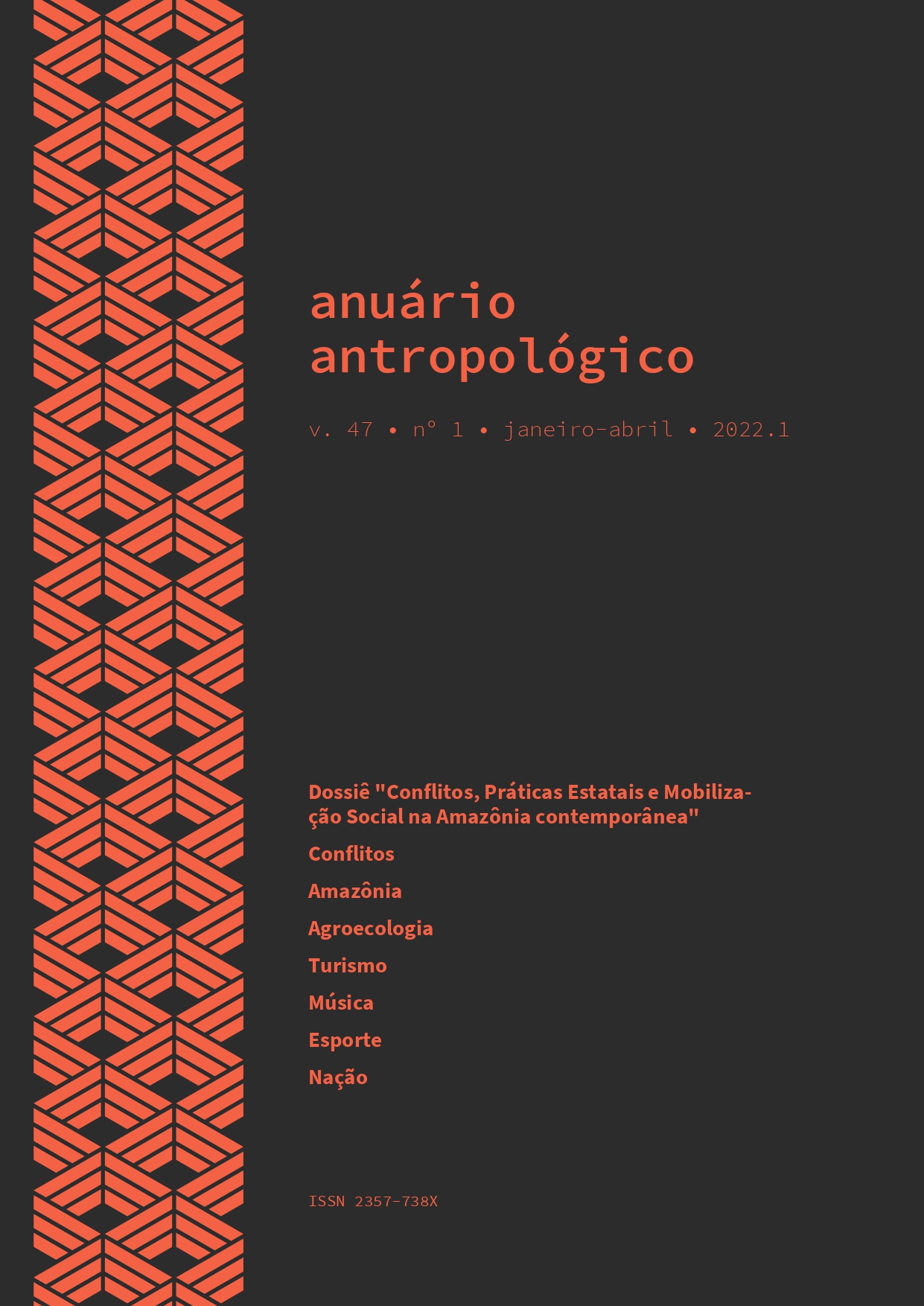From the bush to the stage: nation building in Mozambique through music
DOI:
https://doi.org/10.4000/aa.9483Keywords:
Moçambique, música tradicional, nação, festivais de cultura, ÁfricaAbstract
This article discusses the first National Festival of Traditional Music and Song (1980-1981) in Mozambique. It regards this festival as the most important initiative promoted by the Frelimo government (Frente de Libertação de Moçambique) as part of its nation-building project during the first years after the country's independence in the musical field. After describing and analyzing the programming of this festival, I will recover the heated debate promoted by the mainstream press about dilemmas involved in its organization and about the classification of "traditional music". On the stages built in the capital, Maputo, people from the various provinces of the country came to be known as artists, a denomination acquired when they were urged to abandon their "tribal" ties. I argue that, despite the various political transformations that the country has undergone in recent decades, especially after the end of the civil war (1976/1977-1992), the National Festival of Song and Traditional Music has remained a paradigm. From the 2000s onwards, the holding of cultural festivals continues to be a central strategy for building national unity.
Downloads
References
Anderson, Benedict. 2008. Comunidades Imaginadas. Reflexões sobre a origem e a difusão do nacionalismo. Trad. Denise Bottmann. São Paulo: Companhia das Letras.
Andrieu, Sarah. 2013. “Une forme globalisée, des enjeux localisés: Les festivals culturels régiounaux au Burkina Faso des années 1990 à aujourd’hui”. In Une histoire des festivals XX-XXI siècle, org. Anaïs Fléchet et al., 123–38. Paris: Publications de la Sorbonne.
Apter, Andrew. 2005. The Pan-African nation: oil and spectacle of culture in Nigeria. Chicago: The University of Chicago Press.
Apter, Andrew. 2016. “Beyond Negritude: Black Cultural Citizenship and the Arab Question in FESTAC’77”. In The First World Festival of Negro Arts, Dakar 1966. Contexts and Legacies, org. David Murphy, 151–65. Liverpool: Liverpool University Press. DOI : 10.1080/13696815.2015.1113126
Cabaço, José Luís. 2009. Moçambique: identidade, colonialismo e libertação. São Paulo: Editora UNESP.
Cahen, Michel. 1987. Mozambique: la révolution implosée. Paris: Éditions L’Harmattan.
Costa, Alda. 2013. Arte em Moçambique: entre a construção da nação e o mundo sem fronteiras (1932-2004). Lisboa: Babel.
Darch, Colin. 2018. Historical dictionary of Mozambique. Series: Historical dictionaries of Africa. Lanham, Maryland: Rowman & Littlefield.
De Jong, Ferdinand. 2016. “Cultural Festivals in Senegal: Archives of Tradition, Mediations of Modernity”. In The First World Festival of Negro Arts, Dakar 1966. Contexts and Legacies, org. David Murphy, 166–79. Liverpool: Liverpool University Press.
Dias, Margot. 1986. Instrumentos musicais de Moçambique. Lisboa: Instituto de Investigação Científica Tropical/Centro de Antropologia Cultural e Social.
Farré, Albert. 2015. “Assimilados, régulos, Homens Novos, moçambicanos genuínos: a persistência da exclusão em Moçambique”. Anuário Antropológico 40(2): 199-229.
Geffray, Christian. 1988. “Fragments d’un discours du pouvoir (1975-1985): du bon usage d’une méconnaissance scientifique”. Politique Africaine 29: 71-85. DOI : 10.3406/polaf.1988.5158
Geffray, Christian. 1991. A Causa das Armas: Antropologia da Guerra Contemporânea em Moçambique. Porto: Edições Afrontamento.
Honwana, Luís Bernardo. 2017. A velha casa de madeira e zinco. Maputo: Alcance Editores.
Isaacman, Allen and Isaacman, Barbara. 1983. From Colonialism to Revolution, 1900-1982. Boulder, Colorado: Westview Press.
Jopela, Valdemiro. 2006. “Para uma caracterização da poesia oral nas timbila dos Vacopi e alguns aspectos do contributo português 1940-2005”. Tese de doutorado, Universidade de Lisboa.
Kopytoff, Igor. 1977. “Matrilineality, residence, and residential zones”. American Ethnologist 4: 539-58. DOI : 10.1525/ae.1977.4.3.02a00090
Kruks, Sonia. 1987. “From Nationalism to Marxism: the ideological history of Frelimo, 1962-1977”. In Studies in Power and Class in Africa, ed. Irving Leonard Markovitz, 237–56. New York: Oxford University Press.
Macagno, Lorenzo. 2009. “Fragmentos de uma imaginação nacional”. Revista Brasileira de Ciências Sociais 24(70): 17–35. DOI : 10.1590/S0102-69092009000200002
Morais, Sara S. 2020. “O Palco e o Mato. O lugar das timbila no projeto de construção da nação em Moçambique”. Tese de doutorado, Universidade de Brasília.
Munguambe, Amândio Didi. 2000. A Música Chope. Maputo: Promédia.
Murphy, David. 2016. “Introduction. The Performance of Pan-Africanism: Staging the African Renaissance at the First World Festival of Negro Arts”. In The First World Festival of Negro Arts, Dakar 1966. Contexts and Legacies, org. David Murphy, 1–42. Liverpool: Liverpool University Press.
Newitt, Malyn. 1995. A History of Mozambique. Bloomington and Indianapolis: Indiana University Press.
Rita-Ferreira, António. 1975. Povos de Moçambique: história e cultura. Porto: Afrontamento.
Siliya, Carlos Jorge. 1996. Ensaio sobre a cultura em Moçambique. Maputo: Publicita.
Trajano Filho, Wilson. 1993. Rumores: uma narrativa da nação. Série Antropologia 143: 2-35.
Trajano Filho, Wilson. 2010. “Território e idade: ancoradouros do pertencimento nas manjuandadis da Guiné-Bissau”. In Lugares, Pessoas e Grupos: as lógicas do pertencimento em perspectiva internacional, org. Wilson Trajano Filho, 225–55. Brasília: Athalaia.
Trajano Filho, Wilson. 2016. “O projeto nacional na Guiné-Bissau: uma avaliação”. Estudos Ibero-Americanos 42(3): 913-43. DOI : 10.15448/1980-864X.2016.3.24227
Wane, Marílio. 2010. “A Timbila chopi: construção de identidade étnica e política da diversidade cultural em Moçambique (1934-2005)”. Dissertação de mestrado, Universidade Federal da Bahia.
Webster, David J. 2009. A sociedade Chope: indivíduo e aliança no Sul de Moçambique, 1969-1976. Lisboa: ICS.
Downloads
Published
Issue
Section
License
Copyright (c) 2023 Anuário Antropológico

This work is licensed under a Creative Commons Attribution-NonCommercial-NoDerivatives 4.0 International License.
https://creativecommons.org/licenses/by/4.0/legalcode.en
Creative Commons - Atribución- 4.0 Internacional - CC BY 4.0
https://creativecommons.org/licenses/by/4.0/legalcode.en



